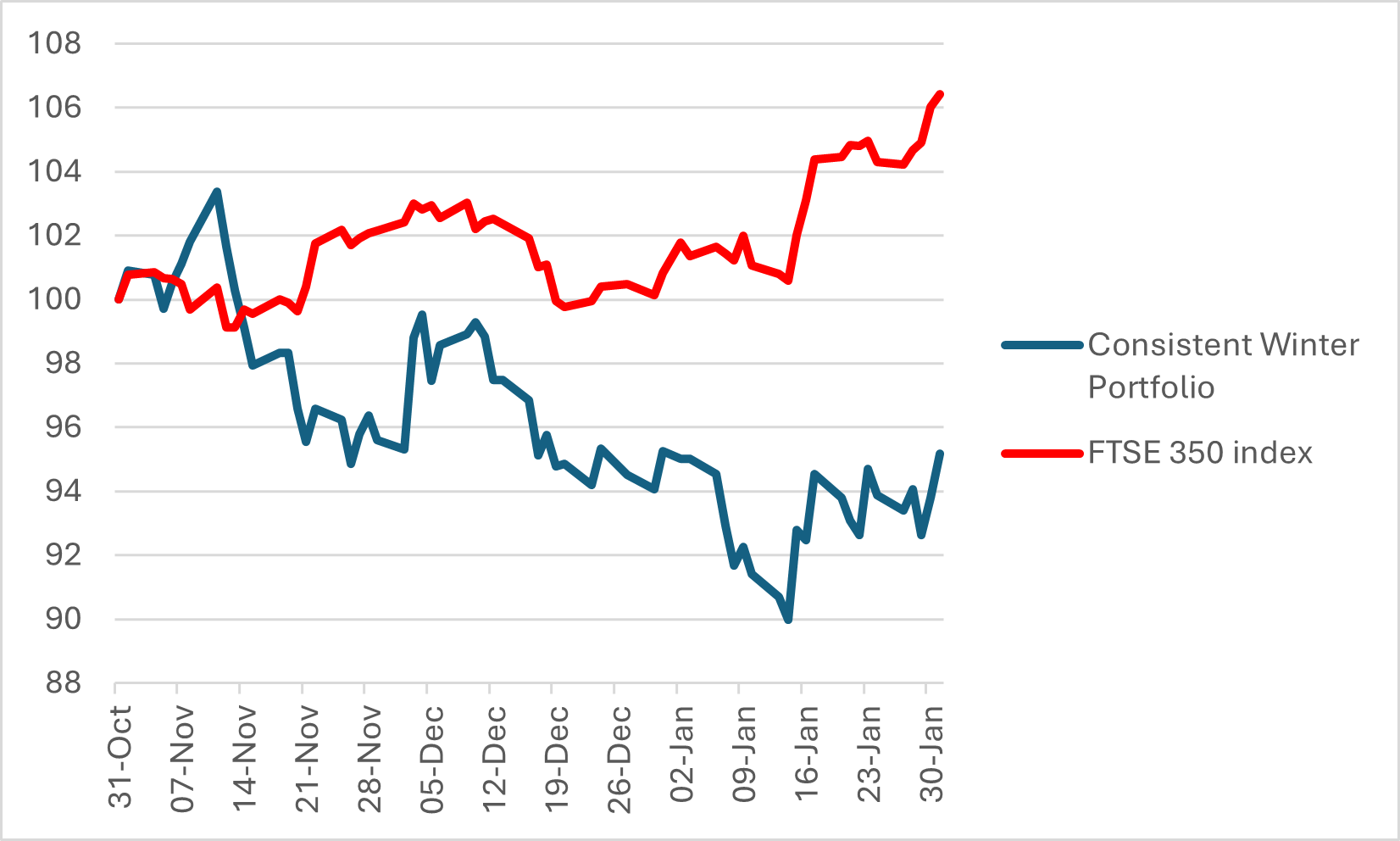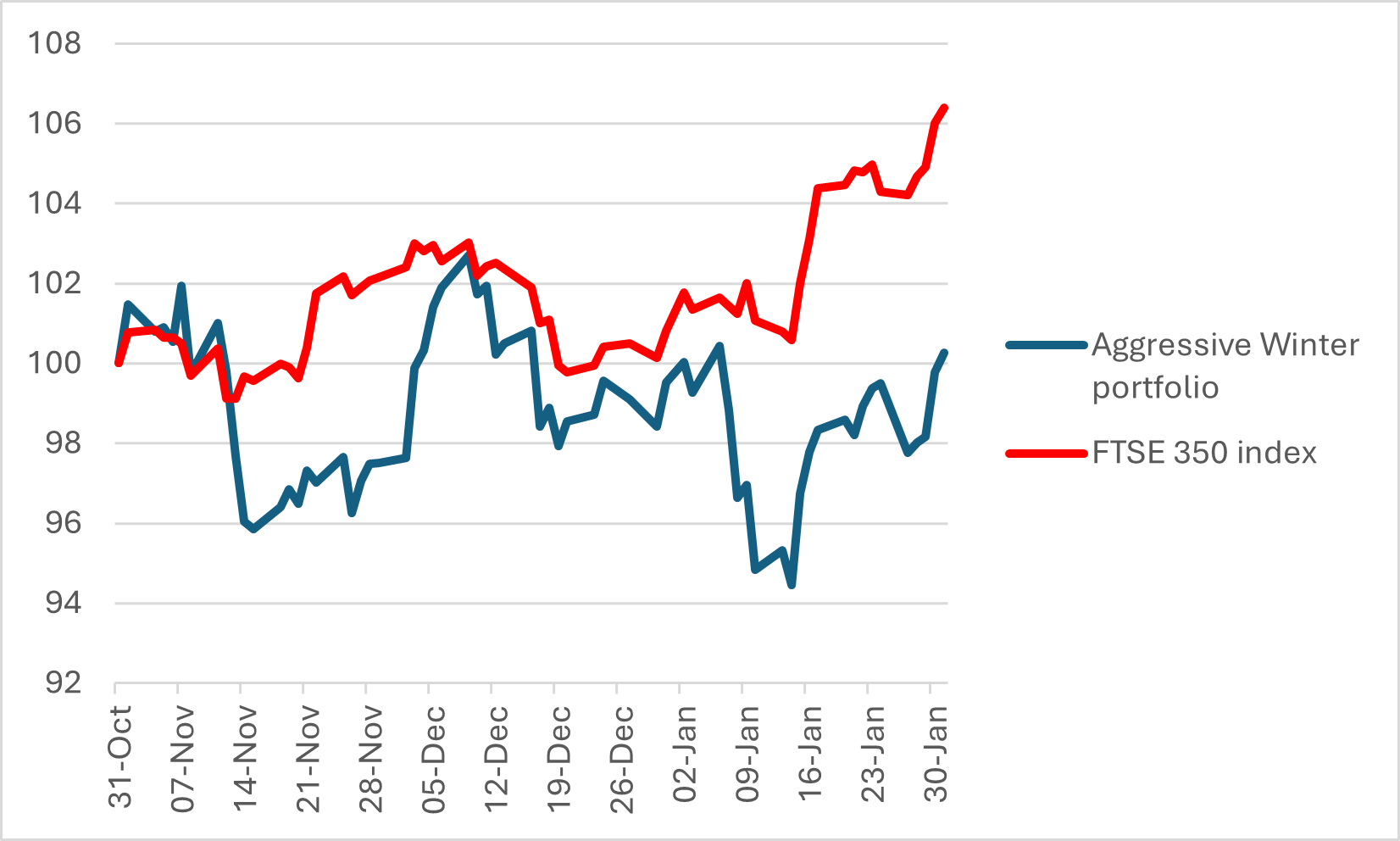Wild’s Winter Portfolios 2024: scores at the halfway point
A couple of problem stocks have weighed on this year’s seasonal portfolio, but there’s an opportunity to make up for it in the final three months of the strategy. Lee Wild has the latest.
11th February 2025 14:33
by Lee Wild from interactive investor

January has been a mixed bag for stock markets. It once had a reputation for big returns, but recent years have not been much to shout about. While Wall Street extended gains a year ago, UK stocks remained stuck in a sideways range. But this year it was all change. Suddenly, the UK is where the hot money’s flowing to.
The FTSE 100 made a record high mid-month and went on to end January with a 6.1% gain. The FTSE All-Share index added 5.4% last month. America’s S&P 500 only managed to add 2.7%, while the Nasdaq tech index finished with a monthly return of 1.6%.
- Invest with ii: Top UK Shares | Share Tips & Ideas | Cashback Offers
Behind the UK’s resurgence were stocks such as Airtel Africa Ordinary Shares (LSE:AAF) which rallied 27%, St James's Place (LSE:STJ) up 21%, Smiths Group (LSE:SMIN) 20% and Spirax Group (LSE:SPX) 18%. Four-fifths of the blue-chip index ended the month in positive territory.
Wild’s Consistent Winter Portfolio, made up of the five FTSE 350 companies that have risen the most winters (between 1 November and 30 April) over the past decade, eased 0.06% in January, extending losses for the first three months by a fraction to 4.8%.
We relax the entry criteria slightly for Wild’s Aggressive Winter Portfolio, giving up some consistency in return for potentially bigger profits (all constituents are up at least 80% of winters over the past decade). This portfolio rose 0.8% over the month and is now up 0.3% since launch. The FTSE 350 benchmark index benefited from the wider market rally, jumping 5.5% in January and is now up 6.4% this winter.
Wild’s Consistent Winter Portfolio 2024-25

Past performance is not a guide to future performance.
There was only one company to rave about in this normally reliable portfolio – Spectris (LSE:SXS). A short trading update from the precisioninstrumentation firm outlined strong trading during its fourth quarter, just months after it warned about a market recovery. The dramatic turnaround triggered a 21% share price rally to levels not seen in over six months.
Monthly performance elsewhere in this year’s portfolio was disappointing. Hilton Food Group (LSE:HFG) dropped into the red for the winter after dropping 2.5% in January. A full-year update was encouraging, with adjusted profit tipped to rise 15% following a strong Christmas. But the news failed to generate much excitement.
- 10 shares to give you a £10,000 annual income in 2025
- 16 UK stocks least likely to be impacted by Trump tariffs
After a great start to the portfolio period, electronic components companydiscoverIE Group (LSE:DSCV) gave it all back, and some. The shares fell 9.9% in January, with much of the damage done before an in-line trading update at the end of the month. Initial optimism around the £25.9 million acquisition of German specialist sensor Burster also failed to stick. Discoverie shares have found support around the 600p area at various points over the past five years. Hopefully, this time will be the same.
And now it’s time for the terrible twins - Keller Group (LSE:KLR) and Safestore Holdings Ordinary Shares (LSE:SAFE). This pair has been responsible for most of the losses in this year’s consistent portfolio, and both had a grim start to 2025.
Ground engineer Keller lost 5.2% over the month to extend winter losses to 16%. I keep saying it was always the stock most likely to give up ground this season, just because the shares had done so well over the past few years. There was no stock-specific news in January, and the losses came in the first half of the month. Hopefully, the steady end to January is a signal that the worst is over.
Safestore’s annual results delivered mid-month didn’t go down well. The self-storage provider made more money than the year before but raised concerns about inflationary cost pressures this year. However, while a number of analysts cut price targets to nearer the 700p mark, Safestore CEO Frederic Vecchioli spent £410,000 on shares at 628.4p. As with Keller, investors will be hoping the share price’s current pause at 600p is a good sign.
Wild’s Aggressive Winter Portfolio 2024-25

Past performance is not a guide to future performance.
That the aggressive portfolio is just about in positive territory this winter is down to Intermediate Capital Group (LSE:ICG) and Antofagasta (LSE:ANTO).
Private equity investment firm Intermediate rallied 14.7% in January to stand 15% higher for the winter. The jump followed a third-quarter update that showed growth in assets under management to $107 billion, up 5.1% on the previous quarterat constant currency and 27.5% over the past year.
Antofagasta also bounced back from a weak start to the strategy. Its share price rose 8.5% last month to leave it almost breakeven for the winter so far. The copper miner started the month well, then consolidated gains after a strong fourth-quarter production report.
- Sign up to our free newsletter for investment ideas, latest news and award-winning analysis
- Why the pound’s decline can be a shrewd investor’s gain
Elsewhere, construction and regeneration business Morgan Sindall Group (LSE:MGNS) fell 5.5% to give a 1.6% deficit for the past three months. It would have been worse but for a bounce back mid-month when it announced a successor to current chair Michael Findlay. He’ll hand over to Peter Harrison, chief executive at Schroders until November last year, in July.
With Keller appearing in both portfolios, PPHE Hotel Group Ltd (LSE:PPH) rounds off this month’s report. Having had a cracking start to the winter, a 7.4% loss in January reduced gains for the past three months to a modest 4.4%. Shares in the hospitality real estate company felt the brunt of a bond market sell-off and concerns about Trump tariffs. A year-end trading update at the end of the month was well-received though, offsetting some of the earlier losses.
These articles are provided for information purposes only. Occasionally, an opinion about whether to buy or sell a specific investment may be provided by third parties. The content is not intended to be a personal recommendation to buy or sell any financial instrument or product, or to adopt any investment strategy as it is not provided based on an assessment of your investing knowledge and experience, your financial situation or your investment objectives. The value of your investments, and the income derived from them, may go down as well as up. You may not get back all the money that you invest. The investments referred to in this article may not be suitable for all investors, and if in doubt, an investor should seek advice from a qualified investment adviser.
Full performance can be found on the company or index summary page on the interactive investor website. Simply click on the company's or index name highlighted in the article.
Disclosure
We use a combination of fundamental and technical analysis in forming our view as to the valuation and prospects of an investment. Where relevant we have set out those particular matters we think are important in the above article, but further detail can be found here.
Please note that our article on this investment should not be considered to be a regular publication.
Details of all recommendations issued by ii during the previous 12-month period can be found here.
ii adheres to a strict code of conduct. Contributors may hold shares or have other interests in companies included in these portfolios, which could create a conflict of interests. Contributors intending to write about any financial instruments in which they have an interest are required to disclose such interest to ii and in the article itself. ii will at all times consider whether such interest impairs the objectivity of the recommendation.
In addition, individuals involved in the production of investment articles are subject to a personal account dealing restriction, which prevents them from placing a transaction in the specified instrument(s) for a period before and for five working days after such publication. This is to avoid personal interests conflicting with the interests of the recipients of those investment articles.